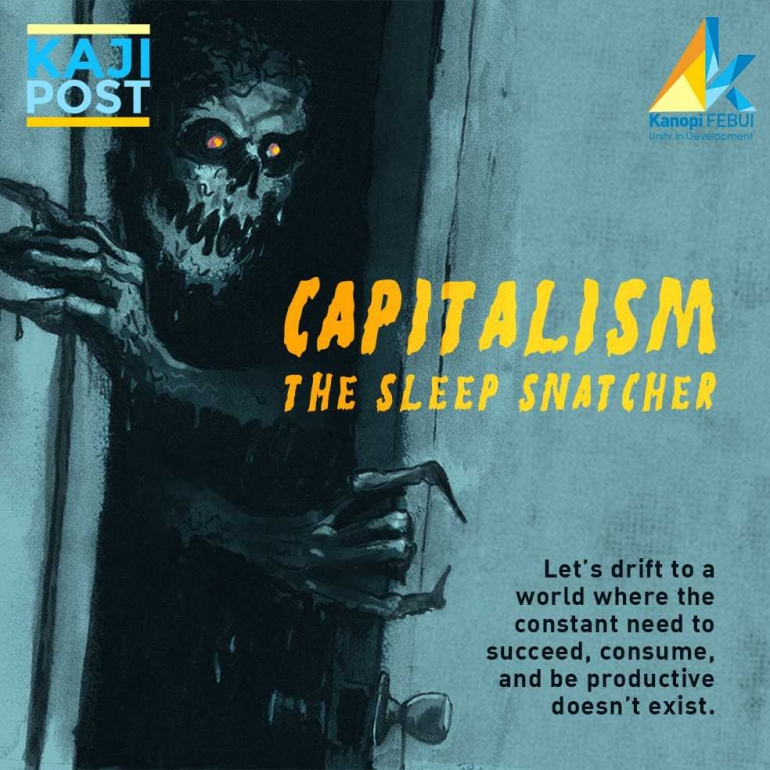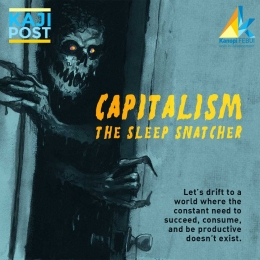Seeing capitalism as a mere abstract economic system is an insult to its multiplicities that can be felt today. Capitalism is a system that based its principle on competition and profit. Capitalist system shapes our culture, politics and even our natural needs. A culture's sanctity is now sacrificed for a commercial gain. Native American headdresses worn in Coachella wiping out its history and meaning for aesthetic purpose. In politics, we see how the control of government is narrowly concentrated at the top 10% of the income scale while the rest has been virtually disenfranchised. Another difference could be seen on how humans' natural needs have been commodified. The need to eat and drink has been transformed into the need to visit a fancy restaurant to satisfy our ego and the need to socialise that has been utilised by social media companies. However, there is one thing that is still out of reach for the capitalist system to exploit: Our need to sleep.
As the main principle of capitalism is about competing with other people and being pushed to work in order to survive in the market, sleep becomes an uncompromised interference to the capitalist system. When people sleep, their time could not be harnessed to produce profitability since it is impossible to both consume and produce economic value at the same time. The appearance of internet also contributes enormously on generating more productivity. Using the internet, goods and services are expected to operate 24/7 because it transcends time boundaries. As a result, capitalist system designs people to prevent them from sleeping. This culture manifests on how people value what success means. Now, not only do success measured by how much wealth people have, but also how hard people work. Top companies' CEOs are bragging about how much work they do each day. Apple's CEO, Tim Cook, told Time that he begins his day at 3.45am not to be outshined; while, Yahoo's CEO, Marissa Mayer, told Bloomberg News that she used to work 18 hours a day. This transforms the way people think about themselves. When they lose their job, or get stuck in lower middle class, they will blame themselves for not being able to work hard enough. Resting becomes a sign of weakness, while 'working like a machine' is coined as a praise.
The result of this perspective is millions of people ignored their need to sleep to do more work. Let's take a look at the percentage of people who admit they get less than 6 hours of sleep in 1998, compared to the percentage in 2017. There is an 18% increase in people who admit that they sleep less than 6 hours. A research conducted by Weinberg and Bealer in 2001 found out that American caffeine consumption is estimated at 200 mg daily for non-- coffee drinkers and nearly twice for those who drink coffee. This is equivalent to 1 to 2 pots of coffee a day to stay awake. It is not surprising that more people are having trouble to fall asleep as the National Academy of Sciences estimates that fifty to seventy million Americans suffer from a chronic disorder of sleep and wakefulness. In addition, a research on creating a sleepless soldier by Pentagon is now in progress, with huge possibility to commercialise.
When sleep can't be prevented by individuals, other alternatives arise. With the use of technology, more companies will try to cut off the middleman. Travel websites replace the conventional travel agent. When a store unable to provide 24/7 service, online shopping is available. Automation is becoming more rampant to gain more productivity and hence profit for the companies. Another way to work around is by giving a late-night shift to a third party, whether by hiring a 'third shift' worker inside the country with a higher wage or outsourcing it to other countries with a lower wage like U.S companies with India-based call centres.
This problem is one of the symptoms of late capitalism. Late Capitalism is first used to describe the economic system from 1945 onwards by Marxist theorist, Ernest Mandell. Nowadays, it is commonly used in to describe the absurdities that our economic system has become. This picture below might explain what kind of 'absurdities' that is referred to.


By: Safira Majory |Ilmu Ekonomi 2017|Staff Kajian Kanopi 2017
--
References:
Crary, Jonathan (2014). 24/7: Late Capitalism and the end of Sleep, London: Verso
http://www.newyorker.com/magazine/2013/03/11/up-all-night-2
http://www.cio.com/article/2439990/outsourcing/inside-outsourcing-in-india.html
https://www.theatlantic.com/video/index/535272/what-does-late-capitalism-really-mean/
Baca konten-konten menarik Kompasiana langsung dari smartphone kamu. Follow channel WhatsApp Kompasiana sekarang di sini: https://whatsapp.com/channel/0029VaYjYaL4Spk7WflFYJ2H












